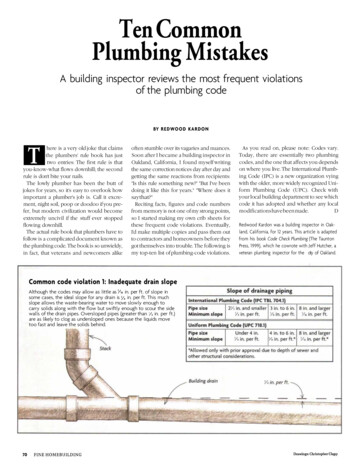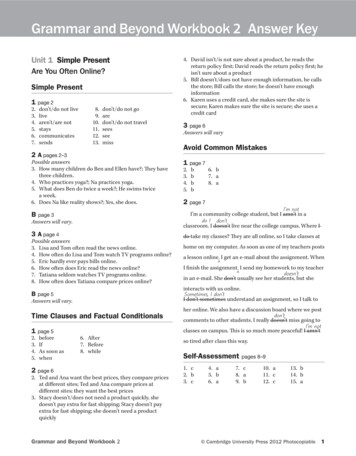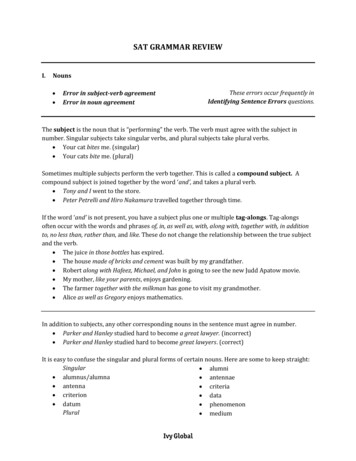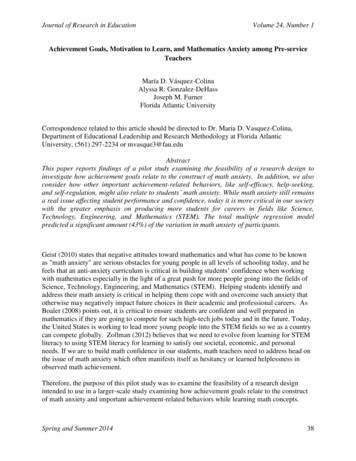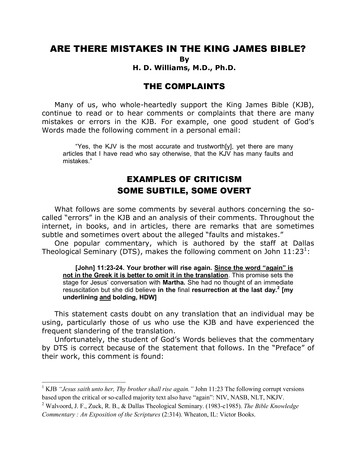
Transcription
ARE THERE MISTAKES IN THE KING JAMES BIBLE?ByH. D. Williams, M.D., Ph.D.THE COMPLAINTSMany of us, who whole-heartedly support the King James Bible (KJB),continue to read or to hear comments or complaints that there are manymistakes or errors in the KJB. For example, one good student of God’sWords made the following comment in a personal email:“Yes, the KJV is the most accurate and trustworth[y], yet there are manyarticles that I have read who say otherwise, that the KJV has many faults andmistakes.”EXAMPLES OF CRITICISMSOME SUBTILE, SOME OVERTWhat follows are some comments by several authors concerning the socalled “errors” in the KJB and an analysis of their comments. Throughout theinternet, in books, and in articles, there are remarks that are sometimessubtle and sometimes overt about the alleged “faults and mistakes.”One popular commentary, which is authored by the staff at DallasTheological Seminary (DTS), makes the following comment on John 11:231:[John] 11:23-24. Your brother will rise again. Since the word “again” isnot in the Greek it is better to omit it in the translation. This promise sets thestage for Jesus’ conversation with Martha. She had no thought of an immediateresuscitation but she did believe in the final resurrection at the last day.2 [myunderlining and bolding, HDW]This statement casts doubt on any translation that an individual may beusing, particularly those of us who use the KJB and have experienced thefrequent slandering of the translation.Unfortunately, the student of God’s Words believes that the commentaryby DTS is correct because of the statement that follows. In the “Preface” oftheir work, this comment is found:1KJB “Jesus saith unto her, Thy brother shall rise again.” John 11:23 The following corrupt versionsbased upon the critical or so-called majority text also have “again”: NIV, NASB, NLT, NKJV.2Walvoord, J. F., Zuck, R. B., & Dallas Theological Seminary. (1983-c1985). The Bible KnowledgeCommentary : An Exposition of the Scriptures (2:314). Wheaton, IL: Victor Books.
ARE THERE MISTAKES IN THE KJB?The Bible Knowledge Commentary is an exposition of the Scriptures writtenand edited solely by Dallas Seminary faculty members. It is designed forpastors, laypersons, Bible teachers, serious Bible students, and others who wanta comprehensive but brief and reliable commentary on the entire Bible.3 [mybolding, HDW]What is implied in this proclamation is that the work of the faculty at such aprestigious institution should be trustworthy.However, consulting every Greek text in my possession, which includesthe Critical Text,4 the Majority Text,5 the Traditional or Received Text6, andothers, reveals the translation in the KJB is correct.The word “again” in the text is from the preposition “ana” (Greek ana),which is used as an proclitic or prefix (meaning to come before)7 withhistemi (Greek i{sthmi). Since the Greek word begins with a vowel, thesecond “a” in “ana” is dropped to form the word and is spelled anistemi(transliterated). This is Strong’s number 450 and clearly means “arise, liftup, raise up (again), rise (again), stand up(-right).” Ana, the Greekpreposition, means from Strong’s:“in compounds (as a prefix) it often means (by implication) repetition,intensity, reversal, etc.”8A CONFLICT OF INTEREST?One cannot help but surmise that the criticism of “again” withoutexplanation in the DTS’s book may be related to DTS involvement with theNIV. In the “Preface” of their work, they state:Second, this is the first two-volume commentary to be based on the NewInternational Version of the Holy Bible (1978 ed.). The NIV is widely accepted asa translation that faithfully rendered the biblical text into clear modern-day3Walvoord, J. F., Zuck, R. B., & Dallas Theological Seminary. (1983-c1985). The Bible KnowledgeCommentary : An Exposition of the Scriptures (1:7). Wheaton, IL: Victor Books.4The Greek New Testament (United Bible Society, edited by Black, Martini, Metzger, Wikgren, 3rdedition, German Bible Society, Stuttgart, 1983).5The New Testament In The Original Greek, Byzantine Textform, 2005 (Maurice A. Robinson andWilliam G. Pierpont, Chilton Book Publishing, Southborough, MA, 2005).6Scrivener’s Annotated Greek New Testament, Being The Exact Greek Textus Receptus That UnderliesThe King James Bible (Dr. Frederick H. A. Scrivener, Dean Burgon Society Press, Collingswood, NJ,1999).7William Hersy Davis, Beginner’s Grammar of the Greek New Testament (Harper Collins Publishers,NY, NY, reproduced by Bible For Today, Inc., by permission, and available from BFT, 900 Park Ave.,Collingswood, NJ, 08108) 44, 50, 65.8Strong’s Greek Dictionary.2
ARE THERE MISTAKES IN THE KJB?English. The Bible Knowledge Commentary thus becomes immediately useful asa companion to one’s personal Bible study.9ONE EXAMPLE FROM JAMES PRICE’S WORKMore specific examples of criticism are found in the works of Dr. JamesPrice, particularly King James Onlyism, A New Sect. This author does notintend to make a complete rebuttal of Dr. Price’s book. The purpose of thisbrief article is to demonstrate by a few current examples the vain andunnecessary trouncing of the KJB. Dr. Price said:“Heb. 10:23 Scrivener’s TR reads th " ejlpiªdo" (of the hope), but the KJVreads “of our faith.”10And in his footnote, he writes:This may not be a textual problem. It may be regarded as a translator’s“oversight” (Scrivener. p.c), because the word elpi" occurs 54 times in 48verses, always translated “hope” except this passage where the AV translatesthe word as “faith.” All English versions made prior to 1611 and all subsequentones render the word as “hope.”11There are many similar comments by Dr. Price throughout his work.Without a doubt, this type of criticism is self-aggrandizing at best or narrowminded at worst.Obviously, the context of the text is speaking about “faith.” The text inthe KJB reads:Having therefore, brethren, boldness to enter into the holiest by the blood ofJesus, By a new and living way, which he hath consecrated for us, through theveil, that is to say, his flesh; And having an high priest over the house of God; Letus draw near with a true heart in full assurance of faith [πιστεως, pisteos], havingour hearts sprinkled from an evil conscience, and our bodies washed with purewater. Let us hold fast the profession of our faith [ελπιδος elpidos] withoutwavering; (for he is faithful [πιστος pistos] that promised;) And let us considerone another to provoke unto love and to good works: Hebrews 10:19-24 [myadditions, HDW].9Walvoord, J. F., Zuck, R. B., & Dallas Theological Seminary. (1983-c1985). The Bible KnowledgeCommentary : An Exposition of the Scriptures (1:7). Wheaton, IL: Victor Books.10James D. Price, King James Onlyism, A New Sect (Published by James D. Price, printed in Singaporeby Saik Wah Press, PTE. LTD.) p. 545.11Ibid.3
ARE THERE MISTAKES IN THE KJB?POLYSEMYPolysemy12 is a linguistic term that is defined as the existence of severalmeanings in a single word. Monosemy indicates a single meaning.Note the use of the derivatives of the substantive, “faith” (pistis), in thecontext of Hebrews 10:19-24. Therefore, the KJB translators understood“polysemy” and used “faith” instead of “hope.” The general understanding ofour “faith” by believers in the Lord Jesus Christ includes the completeassurance of the “hope” that we all have in His promises; that is, “our faith.”Therefore, the KJB translators did not suffer from an “oversight” as Dr. Priceand Dr. Scrivener infer, rather they understood the context and thecomplete meaning of “our faith.” Thus they used “faith” rather than “hope”for elpis (elpidos); either word being a proper translation.I am certain that Dr. Price is a believer and a good man. But, could hisinvolvement with the NKJB13 have anything to do with his extensive criticismof the KJB translation similar to DTS involvement with the NIV and NASB? Ihope and pray this is not so.Others have commented on Dr. Price’s work. Dr. D. A. Waite has writtenan extensive analysis about his book called A Critical Answer to JamesPrice’s King James Onlyism.14 In addition, Dr. Jeffery Khoo, Principal of FarEastern Bible College, Singapore, has written a pungent rebuttal of Dr.Price’s book. In the article, Dr. Khoo said:Anyone reading Price’s anti-KJV book would likely lose confidence in theKJV and be filled with doubts over the faithfulness and accuracy of the KJV, andits underlying Hebrew and Greek texts. If a Multiversions Only advocate wishesto discourage a KJV user from using the KJV, Price’s book might just do the trick.Price spared no effort to show that the KJV is full of mistakes. A young orundiscerning reader might be stumbled and deceived, especially if he does notstart with Scripture itself and believe in God’s promise of special providence inpreserving His inspired Hebrew, Aramaic and Greek words on which the KJV isbased, and how the KJV is a faithful and accurate translation of thoseprovidentially preserved Hebrew, Aramaic and Greek words.1512From New Latin polysēmia, from Greek polusēmos having many meanings, from POLY- sēma a sign.The American Heritage Dictionary of the English Language, Fourth Edition copyright 2000 byHoughton Mifflin Company. Updated in 2009. Published by Houghton Mifflin Company13Dr. Price’s web page: D. A. Waite, Th.D., Ph.D., A Critical Answer To James Price’s King James Onlyism; 225 of Price’sStatements Analyzed Carefully for Errors, Misrepresentations, and Serious Falsehoods (Bible For TodayPress, Collingswood, NJ, April, 2009, BFT #3375, ISBN1-56848-063-6.)15Dr. Jeffery Khoo, “Multiversions Onlyism” (available on the Dean Burgon Society’s ultiversions.htm ).4
ARE THERE MISTAKES IN THE KJB?CONFUSIONWith all who criticize the KJB, the bottom line always seems to result inconfusion. This confusion arises when students of God’s Word attempt tocompare the wording of various versions. Confusion arises when a pastorreads the KJB from the pulpit and the congregation is reading from the manydiffering versions of the dozens of English translations. And not only that,confusion arises when a pastor reads from a ‘new’ translation and thecongregation cut their teeth, “so to speak,” on the KJB. No one these daysseems to be on the same page. There are so many English translations thatcontinue to pour off the printing presses that it has become a vulgarexercise. And as a direct result of the prolific number of translations andtheir biased supporters, this author is appalled at the constant barrage ofinsults, caricatures, and misrepresentations of the KJB. He has always beenperplexed at why any author would criticize the translation, the KJB, thathas done more to advance the Words of God, to lead many to eternal life,and to contribute immensely to English literature than any other version ofthe Bible; and, as far as that is concerned, more than any book. Repeatedly,and almost invariably, this author discovers a conflict of interest by thoseopenly and unabashedly proclaiming a new and better translation. Theyseem to have no fear at creating more and more confusion among the babesin Christ for “filthy lucre” (1 Tim. 6:10, Tit. 1:11)DR. MOORMAN’S BOOKSThe complete reliability of the KJB has recently been demonstrated in avery detailed book just published called, When The KJV Departs From the“Majority” Text. Dr. Waite commented on the book. He said:This book should prove useful to one who seeks to find the specificdifferences between the MT and the TR as well as to find the manuscripts’authority for the Words underlying the King James Bible. The five pages of “Indexof Words and Phrases” helps greatly.16In another detailed and excellent work on Bible chronology, Dr. Moormandemonstrates the complete reliability of the KJB text to establish Biblicaldates. He said:The Bible’s chronology as with all else in Scripture is given and preserved bythe Holy Spirit. Chronology gives the Bible its form, its structure, its actuality.The Bible can be tested in all points, and so in the subject before us it can betested as regards time. Our study here presents the view that the Bible (the16J. A. Moorman, When The KJV Departs From the “Majority” Text [Dean Burgon Society,Collingswood, NJ, 08108]. This book is now available from BFT and it is listed on Amazon.5
ARE THERE MISTAKES IN THE KJB?King James Version translated from the Masoretic and Received Texts)gives a complete, unbroken chronology of the years from the creation ofAdam to the Death of Christ on the Cross. There are no gaps. The Bibleand the Bible alone gives the complete chronology of the years from the FirstAdam to the Last Adam (I Corinthians 15:45). The Bible is not dependent in anyway upon secular chronology to “fill in” any supposed gaps.17 [my bolding, HDW]So, again we see the complete reliability of the KJB translation. Why dowe need dozens of other English translations that are often translated fromcorrupted original language texts or that use English words, which, moretimes than not, lead to a false interpretation?THE KJ3One of the recent ‘new’ translations of the Bible, the KJ3, is proclaimedand advertised as the best version ever. For example, the KJ3 websiteproclaims:This is the first time that any version has contained all of God’s words, as Hewrote them, with no words added, and no words deleted.18AndThis is what the King James Version was meant to be, an exact word-forword translation of the Hebrew and Greek texts.AndNow You Can Know What God Said, Not Just What Men Say He Said.Many other similar statements of this kind are on their website.This translation, the KJ3, is said to be a “literal” translation. Notranslation is completely “literal” or the Hebrew and Greek would not beunderstandable. There has to be a consideration of the syntax, idioms,Hebraisms, etc. for any receptor-language, and particularly the word order.Almost everyone knows that the Greek language emphasizes a word byplacing it first in the text. However, to place a direct object first in an Englishtext would render it almost non-comprehensible. No translation is “literal.”In a discussion with Dr. D. A. Waite, Pastor of Bible For Today BaptistChurch and President of the Dean Burgon Society, we concluded that the17J. A. Moorman, Bible Chronology, The Two Great Divides [Bible For Today Press, Collingswood, NJ,2010]. This book has just been released. It is available through Bible For Today and will be available onAmazon /prod 703.html.186
ARE THERE MISTAKES IN THE KJB?elimination of linguistic characteristics of the KJB such as you, ye, thee, andthe endings of verbs, such as est, eth, etc., eliminates a translation fromcompeting with the KJB, much less all the other considerations. For example,here is ONE instance. Consider John 3:7. It cannot begin to be understoodwithout the English KJB “thee” and “ye” in this verse.Marvel not that I said unto thee [singular], Ye [plural] must be born again.John 3:7 [my addition, HDW]Now consider the Jay P. Green Interlinear, upon which the KJ3translation is based.Do not wonder because I said to you, You must be generated from above.19Let us, as brothers and sisters in Christ, NEVER, NEVER, NEVER [Greekou mh ou me] be so quick to throw out the insurmountable, great Englishtranslation that has won so many to eternal life, that has born the criticaljudgment of well qualified scholars over the centuries, and that has alwaysbeen preeminent. Why contribute to the confusion that is all about us inthese last of the “last days”?There are many more examples and comments that could be made. Ofcourse, there are not many who will even read this short article.May the Lord bless those who desire to spend time leading others to theLord Jesus Christ, who are not willing, or who are not spending, theenormous amount of time and energy it takes to produce another Englishversion to compete with the tested and proven KJB. We have God’s Words inEnglish in the KJB. Why not use it? Why not spend time and money helpingothers to translate His Words into other languages? There are at least 4,000language-groups that do not have even a portion of God’s Words in theirlanguage. The only reason I can see that more are not helping those like Dr.Stephen Zeinner’s20 efforts in this area is because they have not:Lift[ed] up [their] eyes, and look[ed] on the fields; for they are white alreadyto harvest. Jn. 4:35Why not be satisfied with:He that goeth forth and weepeth, bearing precious seed, shall doubtlesscome again with rejoicing, bringing his sheaves with him. Psalms 126:6That precious seed is already in the King James Bible, accurately andfaithfully translated.19 J. P. Green, The Interlinear Bible, Hebrew, Greek, English, Volume IV, The Interlinear Greek-EnglishNew Testament (Sovereign Grace Publishers, Lafayette, IN, 2000).20 Dr. Zeinner’s website: http://bpsglobal.org/.7
The Bible Knowledge Commentary thus becomes immediately useful as a companion to one’s personal Bible study.9 ONE EXAMPLE FROM JAMES PRICE’S WORK More specific examples of criticism arefound in the works of Dr. James Price, particularly King James Onlyism, A New This author does not Se








